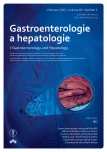-
Medical journals
- Career
Vedolizumab in the therapy of ulcerative colitis patients
Authors: M. Lukáš
Authors‘ workplace: Klinické a výzkumné centrum pro idiopatické střevní záněty ISCARE I. V. F. a. s. a 1. LF UK v Praze
Published in: Gastroent Hepatol 2015; 69(1): 29-32
Category: IBD: Review Article
doi: https://doi.org/10.14735/amgh201529Overview
Vedolizumab is a monoclonal IgG1 antibody, which has been approved to use in clinical practice for ulcerative colitis patients in Europan Union a few months ago. There is a big expectation on availability of vedolizumab at the market in Czech Republic in these year. The clinical research named GEMINI I proved that vedolizumab is a very effective drug in patients with moderate to severe ulcerative colitis. The significant advantages of vedolizumab therapy is a high efficacy in those patients who failed to anti‑TNFα therapy, sustained response due to maintenance therapy with arising effect over time, a minimal drug’s immunogenicity and highly safety drug’s profile, which is caused by a high selectivity for gastrointestinal tract. There are some disadvantages or uncertainty which include slow antiinflammatory therapeutic response, restricted effect on extraintestinal manifestations.
Key words:
vedolizumab – ulcerative colitis – biological therapy
Autor deklaruje, že v souvislosti s předmětem studie nemá žádné komerční zájmy.
The Editorial Board declares that the manuscript met the ICMJE „uniform requirements“ for biomedical papers.Submitted:
12. 1. 2015Accepted:
9. 2. 2015
Sources
1. Bortlík M. Vedolizumab – nová antiintegrinová protilátka s vysokou gastrointestinální selektivitou. Gastroent Hepatol 2014; 68(6): 481 – 484. doi: 10.14735/ amgh 2014481.
2. Raine T. Vedolizumab for inflammatory bowel disease: Changing the game, or more of the same? United European Gastroenterol J 2014; 2(5): 333 – 344. doi: 10.1177/ 2050640614550672.
3. Feagan BG, Rutgeerts P, Sands BE et al.Vedolizumab as induction and maintenance therapy for ulcerative colitis. N Engl J Med 2013; 369(8): 699 – 710. doi: 10.1056/ NEJMoa1215734.
4. Lukáš M. Biologická léčba idiopatických střevních zánětů. In: Pavelka K, Arenberger P, Lukáš M et al (eds). Biologická léčba zánětlivých autoimunitních onemocnění v revmatologii, dermatologii a gastroenterologii. Praha: Grada 2014.
5. Lukáš M. Současnost a budoucnost v léčbě ulcerózní kolitidy.Gastroent Hepatol 2013; 67(3): 212 – 218.
Labels
Paediatric gastroenterology Gastroenterology and hepatology Surgery
Article was published inGastroenterology and Hepatology

2015 Issue 1-
All articles in this issue
- News in 2015
- Not only anti-TNF for IBD patients
- Recommended surgical treatment methods in patients with idiopathic infl ammatory bowel dis eases – part 1: pre-operative preparation
- Eradication of perianal fistulas in IBD patients using the Advancement Flap method and risk factors associated with poor healing
- Vedolizumab in the therapy of ulcerative colitis patients
- Topical treatment of inflammatory bowel diseases
- The importance of fecal calprotectin in the diagnostics and treatment of inflammatory bowel diseases
- Immunoablative therapy and autologous hematopoietic stem cell transplantation in a patient with aggressive Crohn’s disease refractory to medical therapy
- A practical contribution to the diagnostics and treatment of focal nodular hyperplasia and adenomas in the liver from the perspective of a hepatologist, radiologist, pathologist and surgeon
- Short-term results of the treatment of superficial neoplastic lesions of the stomach using endoscopic submucosal dissection
- Small intestinal bacterial overgrowth syndrome
- Exviera, Viekirax
- Nutricia enteral nutrition products for children
- New members of the editorial board
- Calling for cooperation
- VIII. Beskydy Endoscopic Workshop
- Biologic therapy does not affect results of endoscopic balloon dilations in Crohn’s disease patients
- Gastroenterology and Hepatology
- Journal archive
- Current issue
- Online only
- About the journal
Most read in this issue- A practical contribution to the diagnostics and treatment of focal nodular hyperplasia and adenomas in the liver from the perspective of a hepatologist, radiologist, pathologist and surgeon
- Small intestinal bacterial overgrowth syndrome
- Topical treatment of inflammatory bowel diseases
- Eradication of perianal fistulas in IBD patients using the Advancement Flap method and risk factors associated with poor healing
Login#ADS_BOTTOM_SCRIPTS#Forgotten passwordEnter the email address that you registered with. We will send you instructions on how to set a new password.
- Career

